人教新目标版英语八年级下Unit 9 Have you ever been to a museum?Section A 4a-4c课件(31张PPT无素材)
文档属性
| 名称 | 人教新目标版英语八年级下Unit 9 Have you ever been to a museum?Section A 4a-4c课件(31张PPT无素材) |
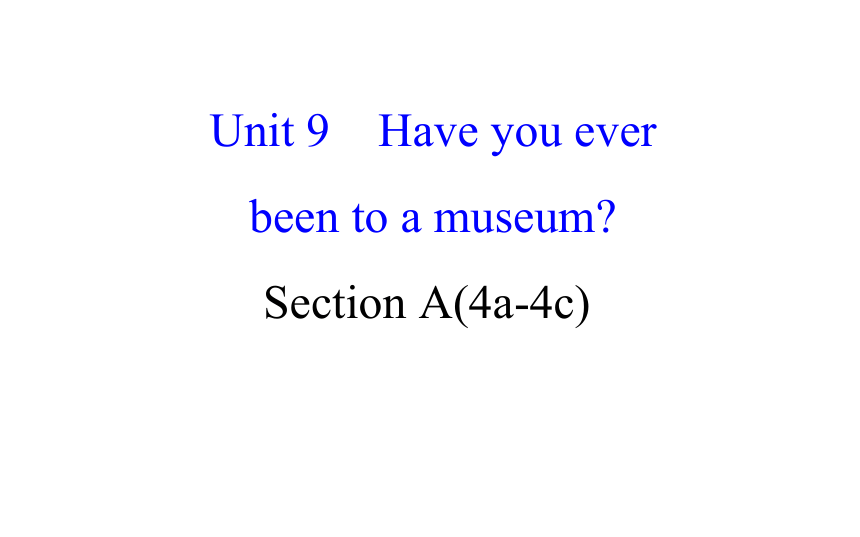
|
|
| 格式 | zip | ||
| 文件大小 | 367.0KB | ||
| 资源类型 | 教案 | ||
| 版本资源 | 人教新目标(Go for it)版 | ||
| 科目 | 英语 | ||
| 更新时间 | 2022-06-07 00:00:00 | ||
图片预览

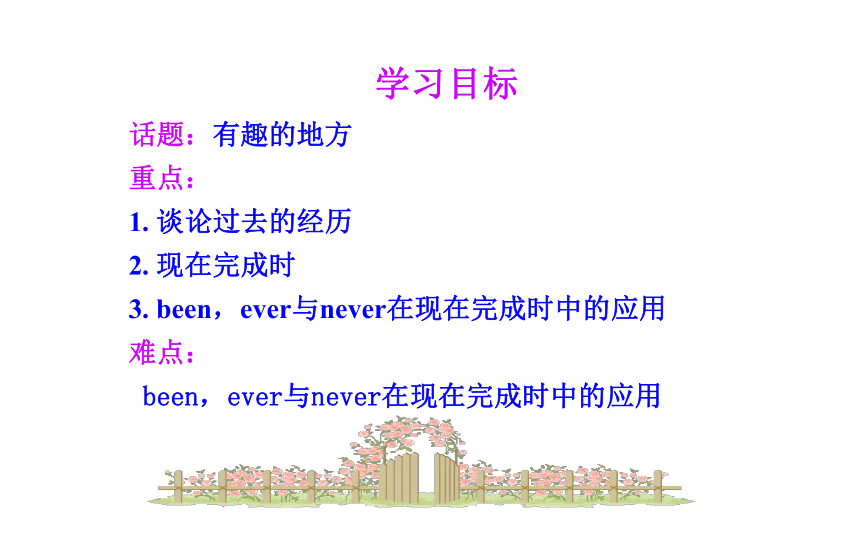
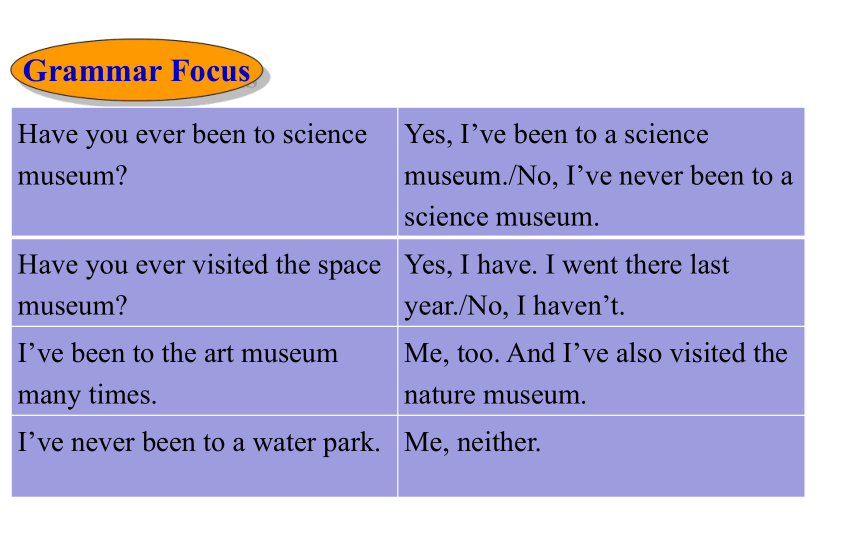
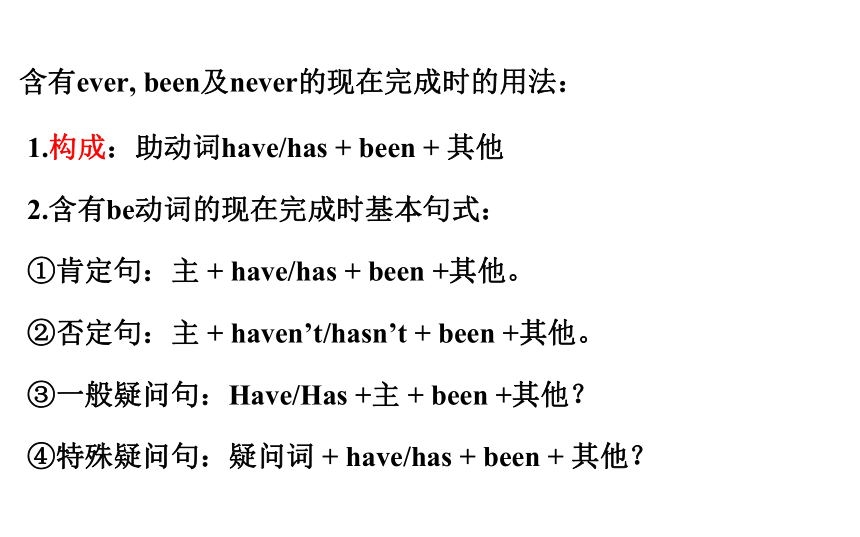
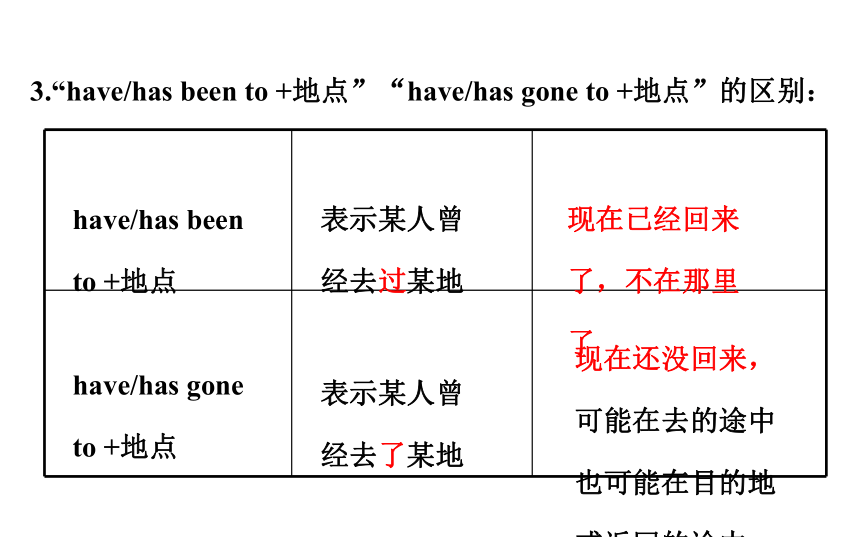
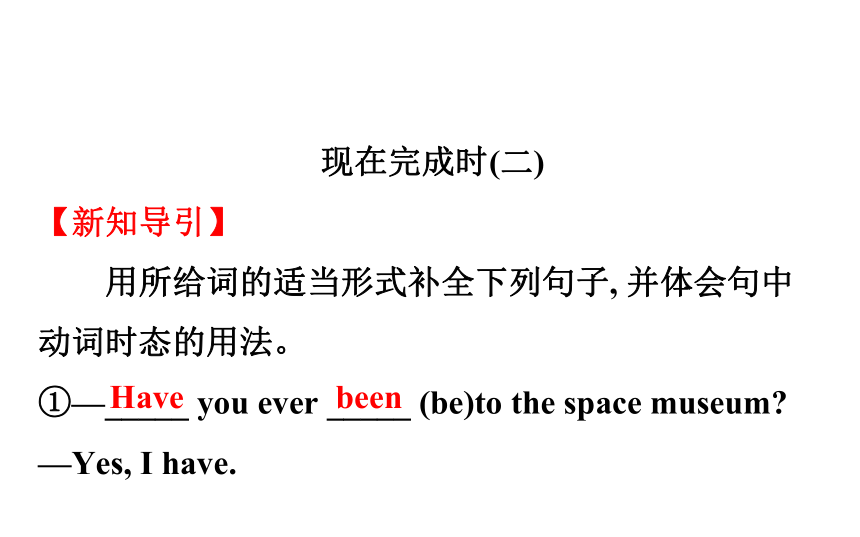
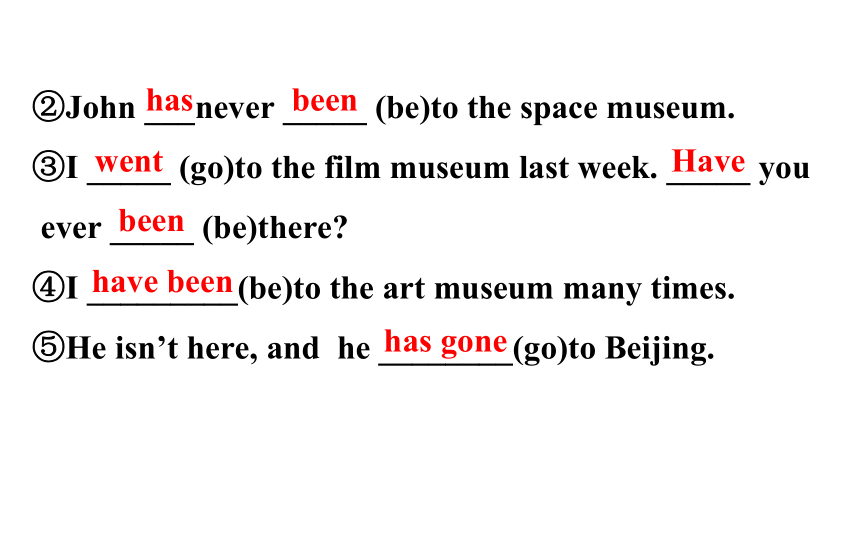

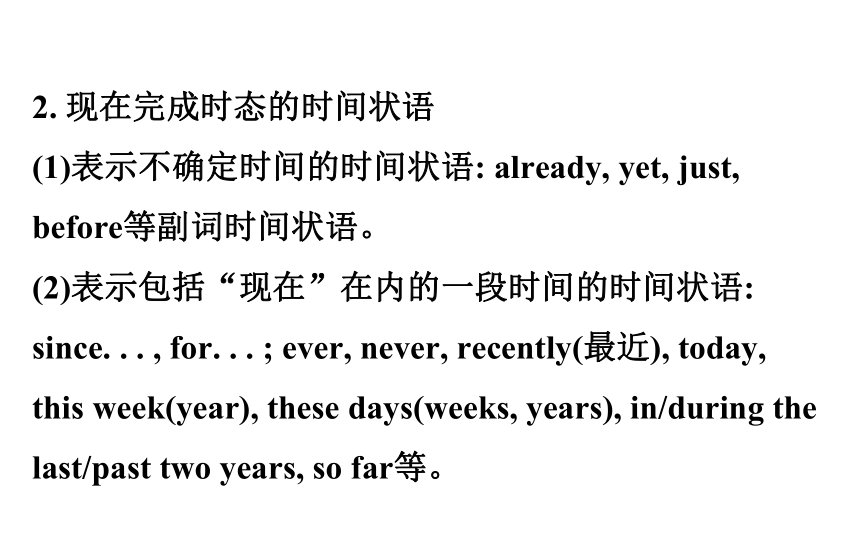
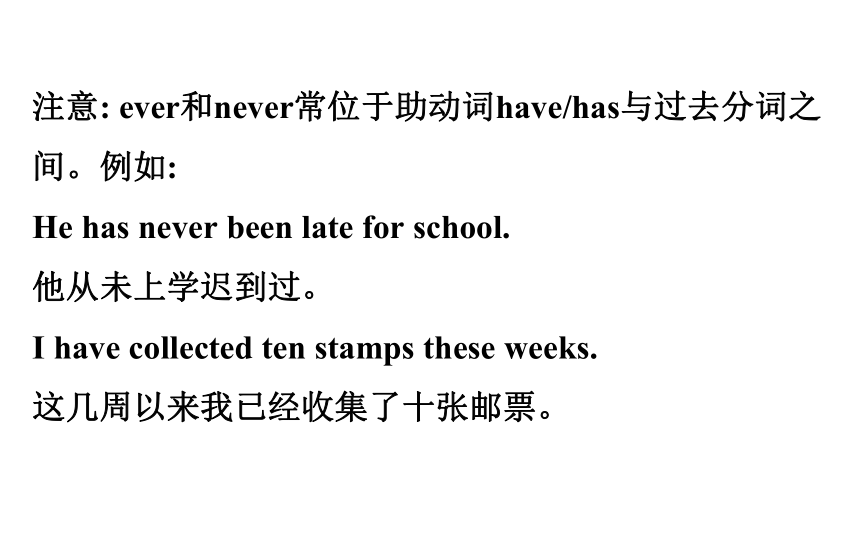
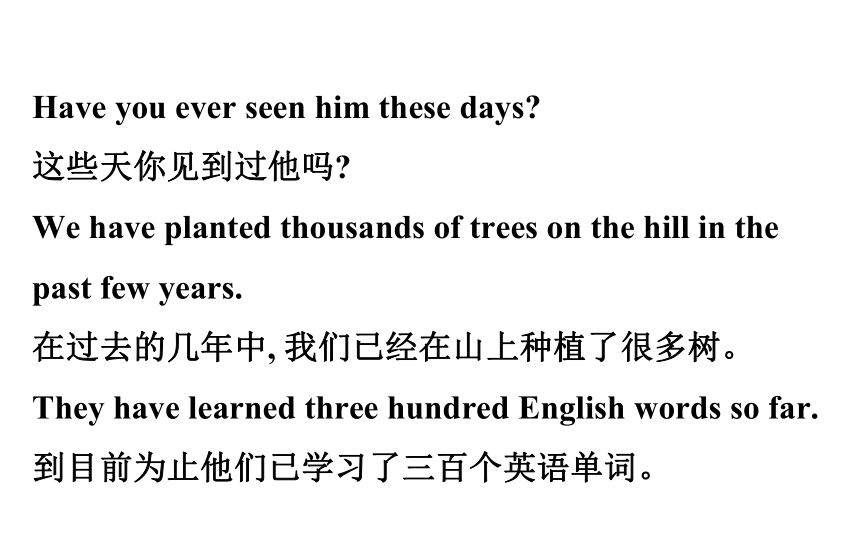
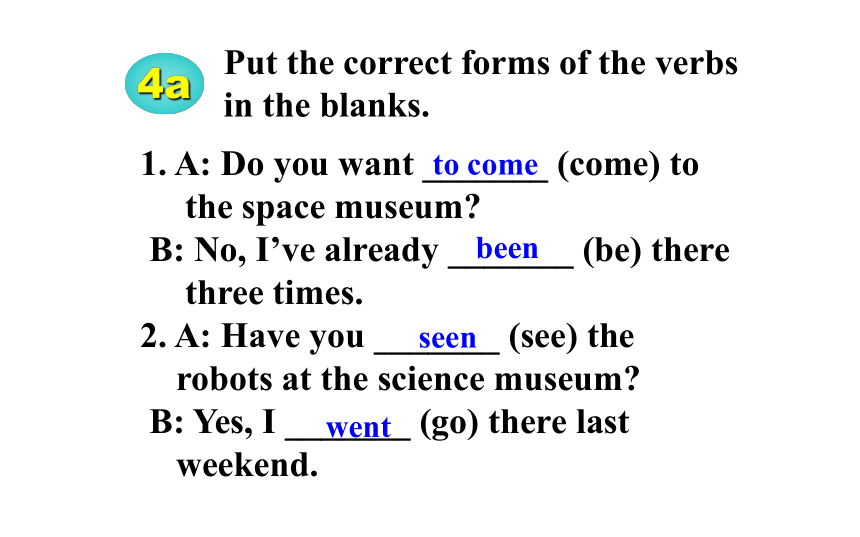
文档简介
(共31张PPT)
Unit 9 Have you ever been to a museum Section A(4a-4c)
学习目标
话题:有趣的地方
重点:
1. 谈论过去的经历
2. 现在完成时
3. been,ever与never在现在完成时中的应用
难点:
been,ever与never在现在完成时中的应用
Grammar Focus
Have you ever been to science museum Yes, I’ve been to a science museum./No, I’ve never been to a science museum.
Have you ever visited the space museum Yes, I have. I went there last year./No, I haven’t.
I’ve been to the art museum many times. Me, too. And I’ve also visited the nature museum.
I’ve never been to a water park. Me, neither.
含有ever, been及never的现在完成时的用法:
1.构成:助动词have/has + been + 其他
2.含有be动词的现在完成时基本句式:
①肯定句:主 + have/has + been +其他。
②否定句:主 + haven’t/hasn’t + been +其他。
③一般疑问句:Have/Has +主 + been +其他?
④特殊疑问句:疑问词 + have/has + been + 其他?
3.“have/has been to +地点”“have/has gone to +地点”的区别:
have/has been to +地点
have/has gone to +地点
表示某人曾经去过某地
现在已经回来了,不在那里了
表示某人曾经去了某地
现在还没回来,可能在去的途中也可能在目的地或返回的途中
现在完成时(二)
【新知导引】
用所给词的适当形式补全下列句子, 并体会句中
动词时态的用法。
①—_____ you ever _____ (be)to the space museum
—Yes, I have.
Have
been
②John ___never _____ (be)to the space museum.
③I _____ (go)to the film museum last week. _____ you
ever _____ (be)there
④I _________(be)to the art museum many times.
⑤He isn’t here, and he ________(go)to Beijing.
has
been
went
Have
been
have been
has gone
【知识详解】
1. have/has been to与have/has gone to的区别
(1)have/has been to意为“曾经到过(某地)”, 强调一种经历, 含有现在已离开那儿之意, 常和just, ever, never等词连用, 后也可接次数, 如once, twice, three times等, 表示“到过(某地)几次”。
(2)have/has gone to意为“到(某地)去了”, 强调说话时该人不在现场, 有可能已到了, 也可能正在去的路上。
2. 现在完成时态的时间状语
(1)表示不确定时间的时间状语: already, yet, just, before等副词时间状语。
(2)表示包括“现在”在内的一段时间的时间状语: since. . . , for. . . ; ever, never, recently(最近), today, this week(year), these days(weeks, years), in/during the last/past two years, so far等。
注意: ever和never常位于助动词have/has与过去分词之间。例如:
He has never been late for school.
他从未上学迟到过。
I have collected ten stamps these weeks.
这几周以来我已经收集了十张邮票。
Have you ever seen him these days
这些天你见到过他吗
We have planted thousands of trees on the hill in the past few years.
在过去的几年中, 我们已经在山上种植了很多树。
They have learned three hundred English words so far.
到目前为止他们已学习了三百个英语单词。
4a
Put the correct forms of the verbs in the blanks.
1. A: Do you want _______ (come) to
the space museum
B: No, I’ve already _______ (be) there
three times.
2. A: Have you _______ (see) the
robots at the science museum
B: Yes, I _______ (go) there last
weekend.
to come
been
seen
went
3. A: Let’s _______ (spend) the day at the
zoo.
B: Well, I’ve already ______ (be) there a
couple of times, but I’m happy ______
(go) again.
4. A: How about _______ (go) to the art
museum There are some special
German paintings there right now.
B: Sure. When do you want _______ (go)
spend
been
to go
going
to go
5. A: Have you ever _______ (visit)
the history museum
B: No, I’ve never ________ (be) there.
visited
been
4b
Fill in the blanks with the correct forms of the verbs in brackets.
Most of us ________ (see) Mickey Mouse, Donald Duck and other famous Disney characters in cartoons before. But have you ever _______(be) to Disneyland Disneyland ______ (be) an amusement park with a special theme-Disney characters and movies.
have seen
is
been
There _______ (be) many exciting rides, lovely restaurants and fantastic gift shops there. You can also _______ (see) the Disney characters walking around the park. And have you ever ________ (hear) of a Disney Cruise This ______ (be) a boat ride with a Disney theme.
are
see
heard
is
You can ______ (take) a ride on the boat for several days and eat and sleep on it. On the boat, you can _______ (shop) and have Disney parties before you _______ (arrive) at the Disney island.
take
shop
arrive
4c
Answer the survey questions and then ask your partner.
Have you ever… You Your partner
been to another province in China
lost something important
1. encourage v. 鼓励
*It also encourages governments and social groups to think about ways to improve toilets in the future.
它也鼓励政府和社会团体思考未来改善厕所的方法。
encourage为及物动词, 意为“鼓励”, 常用结构encourage sb. to do sth. 意为“鼓励某人做某事”。
1.Our country encourages more students______football. Now many football clubs have been set up in schools.
A. play B. playing
C. to play D. will play
C
2.【词义辨析】 a couple of与a pair of辨析
a couple of 常指同类事物中的任意两个或几个, 不一定是成对的或成对使用的
a pair of 意为“一双(对、副……)”, 常指成对的或成对使用的东西, 不能分开的东西
①——你曾经看过韩红现场演唱吗
——当然, 在不同的城市看过几次。
—Have you ever seen Han Hong sing live
—Of course. __________times in different cities.
A couple of
②一对中国大熊猫乐宝和爱宝在今
年三月初到达韩国。
________Chinese giant pandas Le Bao and Ai Bao
arrived in South Korea in early March this year.
A pair of
否定前缀“un-”
un-是一个否定前缀, 表示“不、非”, 常放在一些形
容词、副词和名词前构成一个新词, 新词词义大多与原
词词义_____(相反/相同)。例如: fair→unfair(不公平
的), zable→unable(不能的), happiness→unhappiness
(不幸福), common→uncommon(不一般的)等。
相反
【拓展延伸】 其他表示否定的前缀
常见的表示否定的前缀还有dis-, im-等。例如: agree→disagree(不同意); like→dislike(不喜欢), possible→impossible(不可能的)。
【即学活用】
①Frank failed the math exam. This made him
________ (happy).
②It’s ___________ (believe)that the little boy can
speak English well.
unhappy
unbelievable
Ⅰ. 根据句意及汉语提示完成单词或短语
1. It’s ___________ (难以置信的)that technology has
__________(进步)in such a _____(迅速的)way.
2. I’ve recently been to a very _______(特别的)
museum in India, the International Museum of Toilets
(厕所).
unbelievable
progressed
rapid
unusual
3. It also __________ (鼓励)governments and _____(社
会的)groups to think about ways to improve toilets in
the future.
4. It’s a relaxing and________(和平的)place near a lake.
5. The ______(茶艺)performances are to make a ______
(完美的)cup of tea with beautiful _______(茶具).
encourages
social
peaceful
tea art
perfect
tea sets
Ⅱ. 根据汉语提示完成句子
1. 我去过的最有趣的博物馆是美国计算机博物馆。
The most interesting museum ____ ____ _____ __ is the
American Computer Museum.
2. 那里有关于不同计算机和其发明者的信息。
They have ___________ _____different computers and
these people who invented them.
I’ve
ever
been
to
information
about
3. 它下象棋甚至比人类下得都要好。
It could play chess ______ ____ humans.
4. 我想知道计算机在未来还能多做多少事情。
I wonder ____ _____ ____ computers will be able to
do in the future.
better
than
how
much
more
5. 当我在那里看到这么多不同种类的马桶时, 我简直不
敢相信我的眼睛。
I just ________ ______ ___ ____ when I saw so many
different kinds of toilets there.
couldn’t
believe
my
eyes
【即学活用】
Ⅰ. 用所给动词的适当形式填空
1. He ________(be)to the zoo twice.
2. —Where’s your brother
—He has _______(go)the park with my mother.
3. My hometown ___________(change)a lot in the last
few years.
has been
gone to
has changed
4. —Have you done your homework yet
—Yes, I ___ (do)it last night.
5. My mother ___ never _______ (climb)mountains
before.
did
has
climbed
1. Write a short conversation about
the places that you have ever been to.
2. Preview 1a-1d on page 5.
Unit 9 Have you ever been to a museum Section A(4a-4c)
学习目标
话题:有趣的地方
重点:
1. 谈论过去的经历
2. 现在完成时
3. been,ever与never在现在完成时中的应用
难点:
been,ever与never在现在完成时中的应用
Grammar Focus
Have you ever been to science museum Yes, I’ve been to a science museum./No, I’ve never been to a science museum.
Have you ever visited the space museum Yes, I have. I went there last year./No, I haven’t.
I’ve been to the art museum many times. Me, too. And I’ve also visited the nature museum.
I’ve never been to a water park. Me, neither.
含有ever, been及never的现在完成时的用法:
1.构成:助动词have/has + been + 其他
2.含有be动词的现在完成时基本句式:
①肯定句:主 + have/has + been +其他。
②否定句:主 + haven’t/hasn’t + been +其他。
③一般疑问句:Have/Has +主 + been +其他?
④特殊疑问句:疑问词 + have/has + been + 其他?
3.“have/has been to +地点”“have/has gone to +地点”的区别:
have/has been to +地点
have/has gone to +地点
表示某人曾经去过某地
现在已经回来了,不在那里了
表示某人曾经去了某地
现在还没回来,可能在去的途中也可能在目的地或返回的途中
现在完成时(二)
【新知导引】
用所给词的适当形式补全下列句子, 并体会句中
动词时态的用法。
①—_____ you ever _____ (be)to the space museum
—Yes, I have.
Have
been
②John ___never _____ (be)to the space museum.
③I _____ (go)to the film museum last week. _____ you
ever _____ (be)there
④I _________(be)to the art museum many times.
⑤He isn’t here, and he ________(go)to Beijing.
has
been
went
Have
been
have been
has gone
【知识详解】
1. have/has been to与have/has gone to的区别
(1)have/has been to意为“曾经到过(某地)”, 强调一种经历, 含有现在已离开那儿之意, 常和just, ever, never等词连用, 后也可接次数, 如once, twice, three times等, 表示“到过(某地)几次”。
(2)have/has gone to意为“到(某地)去了”, 强调说话时该人不在现场, 有可能已到了, 也可能正在去的路上。
2. 现在完成时态的时间状语
(1)表示不确定时间的时间状语: already, yet, just, before等副词时间状语。
(2)表示包括“现在”在内的一段时间的时间状语: since. . . , for. . . ; ever, never, recently(最近), today, this week(year), these days(weeks, years), in/during the last/past two years, so far等。
注意: ever和never常位于助动词have/has与过去分词之间。例如:
He has never been late for school.
他从未上学迟到过。
I have collected ten stamps these weeks.
这几周以来我已经收集了十张邮票。
Have you ever seen him these days
这些天你见到过他吗
We have planted thousands of trees on the hill in the past few years.
在过去的几年中, 我们已经在山上种植了很多树。
They have learned three hundred English words so far.
到目前为止他们已学习了三百个英语单词。
4a
Put the correct forms of the verbs in the blanks.
1. A: Do you want _______ (come) to
the space museum
B: No, I’ve already _______ (be) there
three times.
2. A: Have you _______ (see) the
robots at the science museum
B: Yes, I _______ (go) there last
weekend.
to come
been
seen
went
3. A: Let’s _______ (spend) the day at the
zoo.
B: Well, I’ve already ______ (be) there a
couple of times, but I’m happy ______
(go) again.
4. A: How about _______ (go) to the art
museum There are some special
German paintings there right now.
B: Sure. When do you want _______ (go)
spend
been
to go
going
to go
5. A: Have you ever _______ (visit)
the history museum
B: No, I’ve never ________ (be) there.
visited
been
4b
Fill in the blanks with the correct forms of the verbs in brackets.
Most of us ________ (see) Mickey Mouse, Donald Duck and other famous Disney characters in cartoons before. But have you ever _______(be) to Disneyland Disneyland ______ (be) an amusement park with a special theme-Disney characters and movies.
have seen
is
been
There _______ (be) many exciting rides, lovely restaurants and fantastic gift shops there. You can also _______ (see) the Disney characters walking around the park. And have you ever ________ (hear) of a Disney Cruise This ______ (be) a boat ride with a Disney theme.
are
see
heard
is
You can ______ (take) a ride on the boat for several days and eat and sleep on it. On the boat, you can _______ (shop) and have Disney parties before you _______ (arrive) at the Disney island.
take
shop
arrive
4c
Answer the survey questions and then ask your partner.
Have you ever… You Your partner
been to another province in China
lost something important
1. encourage v. 鼓励
*It also encourages governments and social groups to think about ways to improve toilets in the future.
它也鼓励政府和社会团体思考未来改善厕所的方法。
encourage为及物动词, 意为“鼓励”, 常用结构encourage sb. to do sth. 意为“鼓励某人做某事”。
1.Our country encourages more students______football. Now many football clubs have been set up in schools.
A. play B. playing
C. to play D. will play
C
2.【词义辨析】 a couple of与a pair of辨析
a couple of 常指同类事物中的任意两个或几个, 不一定是成对的或成对使用的
a pair of 意为“一双(对、副……)”, 常指成对的或成对使用的东西, 不能分开的东西
①——你曾经看过韩红现场演唱吗
——当然, 在不同的城市看过几次。
—Have you ever seen Han Hong sing live
—Of course. __________times in different cities.
A couple of
②一对中国大熊猫乐宝和爱宝在今
年三月初到达韩国。
________Chinese giant pandas Le Bao and Ai Bao
arrived in South Korea in early March this year.
A pair of
否定前缀“un-”
un-是一个否定前缀, 表示“不、非”, 常放在一些形
容词、副词和名词前构成一个新词, 新词词义大多与原
词词义_____(相反/相同)。例如: fair→unfair(不公平
的), zable→unable(不能的), happiness→unhappiness
(不幸福), common→uncommon(不一般的)等。
相反
【拓展延伸】 其他表示否定的前缀
常见的表示否定的前缀还有dis-, im-等。例如: agree→disagree(不同意); like→dislike(不喜欢), possible→impossible(不可能的)。
【即学活用】
①Frank failed the math exam. This made him
________ (happy).
②It’s ___________ (believe)that the little boy can
speak English well.
unhappy
unbelievable
Ⅰ. 根据句意及汉语提示完成单词或短语
1. It’s ___________ (难以置信的)that technology has
__________(进步)in such a _____(迅速的)way.
2. I’ve recently been to a very _______(特别的)
museum in India, the International Museum of Toilets
(厕所).
unbelievable
progressed
rapid
unusual
3. It also __________ (鼓励)governments and _____(社
会的)groups to think about ways to improve toilets in
the future.
4. It’s a relaxing and________(和平的)place near a lake.
5. The ______(茶艺)performances are to make a ______
(完美的)cup of tea with beautiful _______(茶具).
encourages
social
peaceful
tea art
perfect
tea sets
Ⅱ. 根据汉语提示完成句子
1. 我去过的最有趣的博物馆是美国计算机博物馆。
The most interesting museum ____ ____ _____ __ is the
American Computer Museum.
2. 那里有关于不同计算机和其发明者的信息。
They have ___________ _____different computers and
these people who invented them.
I’ve
ever
been
to
information
about
3. 它下象棋甚至比人类下得都要好。
It could play chess ______ ____ humans.
4. 我想知道计算机在未来还能多做多少事情。
I wonder ____ _____ ____ computers will be able to
do in the future.
better
than
how
much
more
5. 当我在那里看到这么多不同种类的马桶时, 我简直不
敢相信我的眼睛。
I just ________ ______ ___ ____ when I saw so many
different kinds of toilets there.
couldn’t
believe
my
eyes
【即学活用】
Ⅰ. 用所给动词的适当形式填空
1. He ________(be)to the zoo twice.
2. —Where’s your brother
—He has _______(go)the park with my mother.
3. My hometown ___________(change)a lot in the last
few years.
has been
gone to
has changed
4. —Have you done your homework yet
—Yes, I ___ (do)it last night.
5. My mother ___ never _______ (climb)mountains
before.
did
has
climbed
1. Write a short conversation about
the places that you have ever been to.
2. Preview 1a-1d on page 5.
同课章节目录
- Unit 1 What's the matter?
- Section A
- Section B
- Unit 2 I'll help to clean up the city parks.
- Section A
- Section B
- Unit 3 Could you please clean your room?
- Section A
- Section B
- Unit 4 Why don't you talk to your parents?
- Section A
- Section B
- Unit 5 What were you doing when the rainstorm came
- Section A
- Section B
- Review of Units 1-5
- Unit 6 An old man tried to move the mountains.
- Section A
- Section B
- Unit 7 What's the highest mountain in the world?
- Section A
- Section B
- Unit 8 Have you read Treasure Island yet?
- Section A
- Section B
- Unit 9 Have you ever been to a museum?
- Section A
- Section B
- Unit 10 I've had this bike for three years.
- Section A
- Section B
